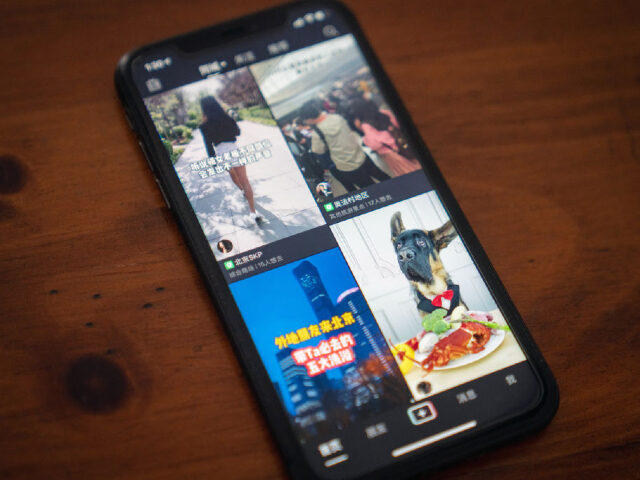China’s state-run Global Times on Sunday proudly reported that the Cyberspace Administration of China (CAC), the leading Internet censorship agency of the Communist government, removed “2.351 million illegal short videos” in a three-month crackdown on “pornography, ugliness, oddness, fake, vulgarity, gambling,” and “undesirable information.”
According to the Global Times, CAC “handled” 563,000 illegal live streaming studios, shut down 120,000 “illegal user accounts,” and punished 218,600 users during the crackdown. Up to $1.77 million worth of penalties were assessed.
Regulars went after videos on 16 platforms, including WeChat and Douyin, the Chinese version of TikTok.
“Platforms such as Kuaishou, Bilibili and Huya Live that spread harmful and undesirable information such as pornography, vulgarity, violent abuse and encouraging tipping to live streamers have been fined and ordered to make rectification,” the Global Times wrote.
The censored videos were not just pornographic, vulgar, or designed to stimulate gambling addictions. Some videos were taken down by CAC because they covered forbidden topics such as the “chaotic life of Internet celebrities,” or disseminated information the censors decided was “illegal” or contrary to “the legitimate rights and interests of the people.”

SHANGHAI, CHINA – AUGUST 2, 2021 – Network anchor from we-media live streaming platforms such as Douyin, Douyu, Kuaishou and Bibili attend ChinaJoy in Shanghai, China, Aug. 2, 2021. On March 31, 2022, the Cyberspace Administration of China, the State Administration of Taxation and the State Administration for Market Regulation jointly issued the Opinions on Further regulating the profit-making activities of online live broadcasting and Promoting the Healthy Development of the Industry. (Photo credit should read Costfoto/Future Publishing via Getty Images)
Chinese censors became very concerned with supposedly obsessive attention paid to the private lives of celebrities last year. Chinese officials denounced “fan culture” because it was addictive to young people and distracted them from productive pursuits, and fan loyalties were sometimes manipulated for aggressive marketing campaigns. Aggressive marketing was another subject of the crackdown that began in March.
Critics of China’s crusade against “fan culture” suspected the authorities were concerned that so many of the celebrities gushed over by Chinese youth were foreigners, especially South Korean “K-pop” musicians.
Barron’s theorized in June that China’s latest Internet crackdown was also meant as a warning shot to tech moguls, whose independence and potential corruption by Western values is a source of constant anxiety for the Chinese Communist Party. Barron’s thought the latest round of tech crackdowns fizzled out a bit early because the Chinese economy is in such a fragile condition.
The South China Morning Post (SCMP) observed last month that CAC’s focus is shifting toward online financial crimes. CAC claims to have removed over 42,000 counterfeit financial apps since the beginning of 2022, adding them to a blacklist that includes over 3.8 million websites and 514,000 apps.
CAC will probably marshal its resources toward controlling public opinion in advance of the Chinese Communist Party Congress this fall when dictator Xi Jinping will make his bid for an unprecedented third term in power.
CAC is perhaps the fastest-growing agency in the Communist government, having swelled to tremendous size in less than ten years of existence. It is more opaque and more directly controlled by Xi and his top Communist Party henchmen than most other Chinese regulatory agencies.

COMMENTS
Please let us know if you're having issues with commenting.